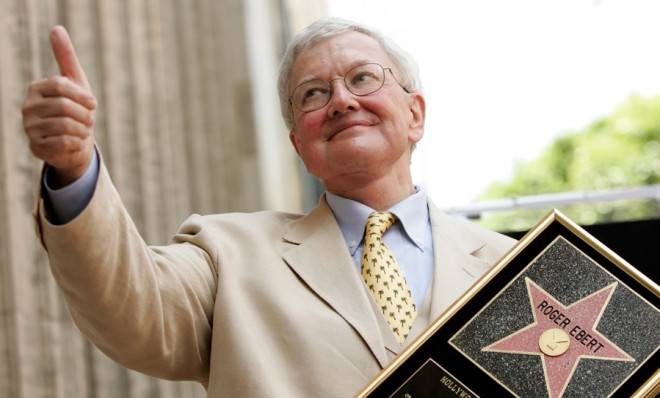Roger Ebert: A remembrance
The legendary film critic leaves behind a remarkable legacy as both a writer and a human being


On Thursday afternoon, the Chicago Sun-Times reported that legendary film critic Roger Ebert had passed away at the age of 70 after an 11-year battle with papillary thyroid cancer. The news comes less than two days after Ebert announced that he planned to take what he called "a leave of presence" from film criticism, which meant that he would do what he said he had "always fantasized about doing": Reviewing only the movies that he wanted to review.
If only we could have him review everything, forever. The scope and depth of Roger Ebert's influence in the field of film criticism cannot be overstated. He inspired countless film lovers from multiple generations — including the one writing this tribute — to think critically about film for the first time. He also remained an honest, reliable arbiter for the entirety of a remarkable career that spanned nearly 50 years at the Chicago Sun-Times.
In 1975, he became the first film critic to win a Pulitzer Prize for criticism. In the same year, he joined the Chicago Tribune's Gene Siskel as co-host of a film review TV show called Sneak Previews. It was eventually renamed At the Movies with Gene Siskel and Roger Ebert, when it became clear that the hosts, and not the previews, were the real stars of the show.
The Week
Escape your echo chamber. Get the facts behind the news, plus analysis from multiple perspectives.

Sign up for The Week's Free Newsletters
From our morning news briefing to a weekly Good News Newsletter, get the best of The Week delivered directly to your inbox.
From our morning news briefing to a weekly Good News Newsletter, get the best of The Week delivered directly to your inbox.
Over his lifetime, Ebert wrote more than 10,000 reviews, delivering raves and pans alike in his warm, inimitable writing style. Whether you agreed or disagreed with his take on a particular movie, his reviews were always fair, and were often such a joy to read that he would half-convince you that you'd been wrong all along.
And he always remained open-minded. After famously panning Vincent Gallo's The Brown Bunny, which he called "the worst film in the history of the festival" after a Cannes screening in 2003, Ebert was quick to praise Gallo's final cut, which ran 26 minutes shorter, as a version that "set free the good film inside" the film he'd originally seen.
But for a man with such unparalleled power and influence in his field, Roger Ebert's true legacy is his legacy as a human being. News of his death has inspired an outpouring of stories describing his kindness and generosity. He was famously devoted to his wife, Chaz, celebrating their 20th wedding anniversary in July 2012 in a blog post titled "Roger loves Chaz." He wrote, "She fills my horizon, she is the great fact of my life, she has my love, she saved me from the fate of living out my life alone, which is where I seemed to be heading."
He was eager to speak with the many young critics he inspired, and was quick to use his talents and fame to help others. When I was just beginning my career as a film and television critic, Ebert found and tweeted out several of my articles — a professional compliment that has never since been equaled, and that I suspect never will.
A free daily email with the biggest news stories of the day – and the best features from TheWeek.com
The sum total of the writing Roger Ebert leaves behind — which includes reviews, blog posts, 15 books, and more than 30,000 tweets — shows a brilliant, challenging, humane, funny, relentlessly curious voice. Ebert proved so irrepressible that even the cancer that literally took away his voice couldn't stop him from being heard. Despite his 11-year battle with cancer, Ebert maintained a stunningly dedicated work ethic without ever becoming pretentious about himself or his work. In 2012, he wrote a career-high 306 movie reviews, along with at least one more article per week, and corresponded with countless fans through email and Twitter. And he always kept reaching for new heights: After 107 failed entries, Ebert finally won The New Yorker's cartoon caption contest in 2011, to his great and vocal delight.
In a characteristic display of generosity, Roger Ebert began what turned out to be his final blog post with the words "thank you," and spent much of it describing his excitement about adding new writers and voices to his blog. I have no doubt that even with the immeasurable loss of Ebert himself, the critics he taught and inspired will carry on his legacy for generations of film lovers to come.
Less than an hour after news of his death had broken, both his personal website and his blog on the Chicago Sun-Times crashed, as legions of fans and mourners tried to steal a little more time in his company by reading the thousands of reviews that he has left behind. It was maddening not to be able to read him at a time when so many of us needed to hear his voice more than ever. Indeed, writing about Roger Ebert makes you wish Roger Ebert were here to write about Roger Ebert. But since he's not, there's no better way to memorialize him than by turning to his own final words, in a fitting tribute to both the man and the medium he loved:
"So on this day of reflection I say again, thank you for going on this journey with me. I'll see you at the movies."
Scott Meslow is the entertainment editor for TheWeek.com. He has written about film and television at publications including The Atlantic, POLITICO Magazine, and Vulture.
-
 7 bars with comforting cocktails and great hospitality
7 bars with comforting cocktails and great hospitalitythe week recommends Winter is a fine time for going out and drinking up
-
 7 recipes that meet you wherever you are during winter
7 recipes that meet you wherever you are during winterthe week recommends Low-key January and decadent holiday eating are all accounted for
-
 Nine best TV shows of the year
Nine best TV shows of the yearThe Week Recommends From Adolescence to Amandaland
